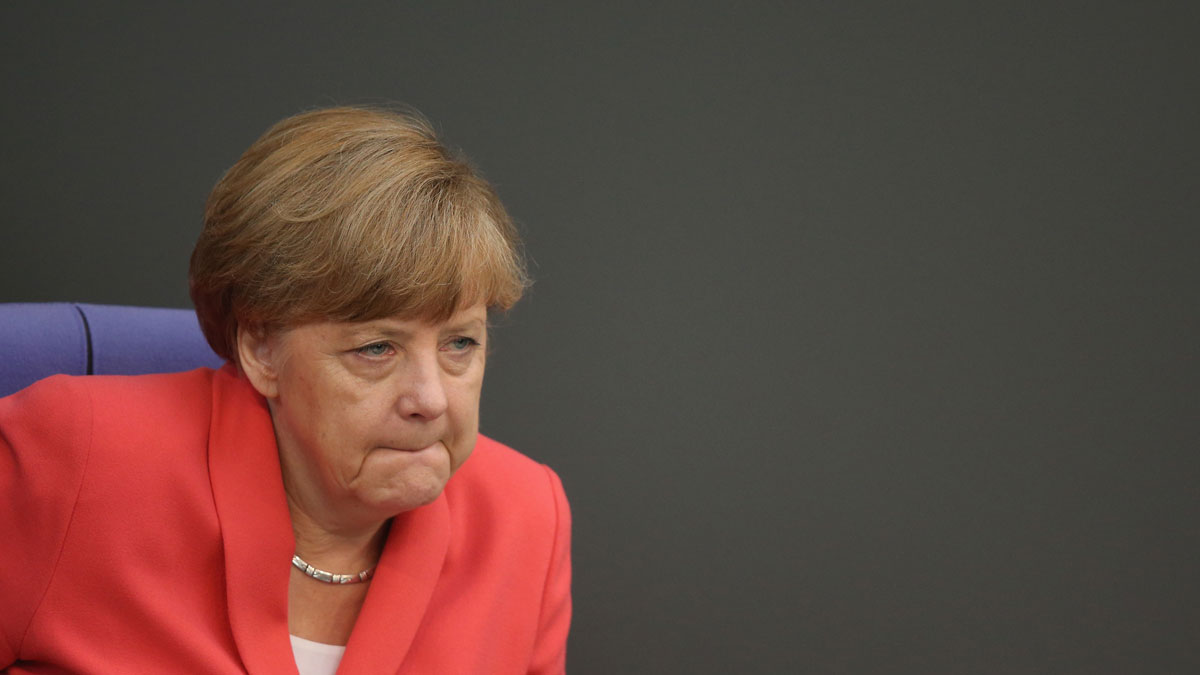Angela Merkel rules out migrant policy reversal
German chancellor pledges to defend freedom and democracy but says she will improve security with extra police

A free daily email with the biggest news stories of the day – and the best features from TheWeek.com
You are now subscribed
Your newsletter sign-up was successful
Germany will not change its refugee policy, despite the recent wave of terror attacks in the country, Angela Merkel said this morning.
The German chancellor told a Berlin news conference that terrorists "want to make us lose sight of what is important to use, break down our cohesion and sense of community as well as inhibiting our way of life".
Ms Merkel's pledge to defend freedom and democracy while improving security will include plans to create more police officers over the next few years and to deploy the German Army in terror attacks. There are also plans to boost the exchange of intelligence with the US, reports the New York Times.
The Week
Escape your echo chamber. Get the facts behind the news, plus analysis from multiple perspectives.

Sign up for The Week's Free Newsletters
From our morning news briefing to a weekly Good News Newsletter, get the best of The Week delivered directly to your inbox.
From our morning news briefing to a weekly Good News Newsletter, get the best of The Week delivered directly to your inbox.
But the recent spate of terror attacks in Germany has underlined growing tensions in the Merkel government, according to the Wall Street Journal. Bavarian Justice Minister Winfried Bausback, told the paper: "Only social romantics can assume that it's enough to react now with more psychologists and more help."
The wave of atrocities is also fuelling anti-migrant feelings in Germany, a country that took in more than one million asylum seekers last year at the height of the refugee crisis. The Independent says Ms Merkel may have hailed last year's decision to allow Syrian refugees to remain under the slogan "Wir schaffen das!" ("We can do it!"), but the positive mood darkened after the New Year's Eve sex attacks in Cologne.
Opposition parties and rebels from Ms Merkel's own conservative bloc are using that sentiment to accuse her of exposing the country to an unacceptable level of risk, says The Guardian.
Bavarian interior minister Joachim Herrmann has called for "urgent action from the federal government and Europe".
A free daily email with the biggest news stories of the day – and the best features from TheWeek.com
The German chancellor's liberal stance on migration still has public support, says Daniela Schwarzer in the Financial Times – but only because the numbers entering Germany "fell dramatically after a fragile deal with Turkey this year".
According to Schwarzer, the tone of the debate in Germany could change if there are more terror attacks and more evidence appears linking refugees to terrorist organisations.
-
 Political cartoons for February 20
Political cartoons for February 20Cartoons Friday’s political cartoons include just the ice, winter games, and more
-
 Sepsis ‘breakthrough’: the world’s first targeted treatment?
Sepsis ‘breakthrough’: the world’s first targeted treatment?The Explainer New drug could reverse effects of sepsis, rather than trying to treat infection with antibiotics
-
 James Van Der Beek obituary: fresh-faced Dawson’s Creek star
James Van Der Beek obituary: fresh-faced Dawson’s Creek starIn The Spotlight Van Der Beek fronted one of the most successful teen dramas of the 90s – but his Dawson fame proved a double-edged sword
-
 Epstein files topple law CEO, roil UK government
Epstein files topple law CEO, roil UK governmentSpeed Read Peter Mandelson, Britain’s former ambassador to the US, is caught up in the scandal
-
 Iran and US prepare to meet after skirmishes
Iran and US prepare to meet after skirmishesSpeed Read The incident comes amid heightened tensions in the Middle East
-
 Israel retrieves final hostage’s body from Gaza
Israel retrieves final hostage’s body from GazaSpeed Read The 24-year-old police officer was killed during the initial Hamas attack
-
 China’s Xi targets top general in growing purge
China’s Xi targets top general in growing purgeSpeed Read Zhang Youxia is being investigated over ‘grave violations’ of the law
-
 Panama and Canada are negotiating over a crucial copper mine
Panama and Canada are negotiating over a crucial copper mineIn the Spotlight Panama is set to make a final decision on the mine this summer
-
 Why Greenland’s natural resources are nearly impossible to mine
Why Greenland’s natural resources are nearly impossible to mineThe Explainer The country’s natural landscape makes the task extremely difficult
-
 Iran cuts internet as protests escalate
Iran cuts internet as protests escalateSpeed Reada Government buildings across the country have been set on fire
-
 US nabs ‘shadow’ tanker claimed by Russia
US nabs ‘shadow’ tanker claimed by RussiaSpeed Read The ship was one of two vessels seized by the US military